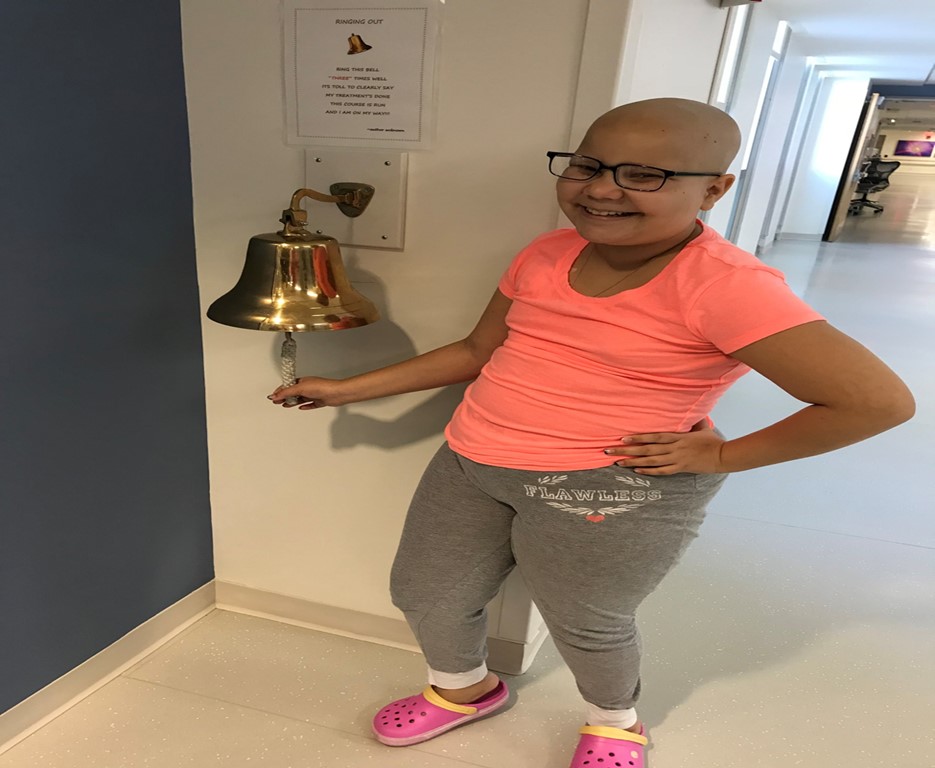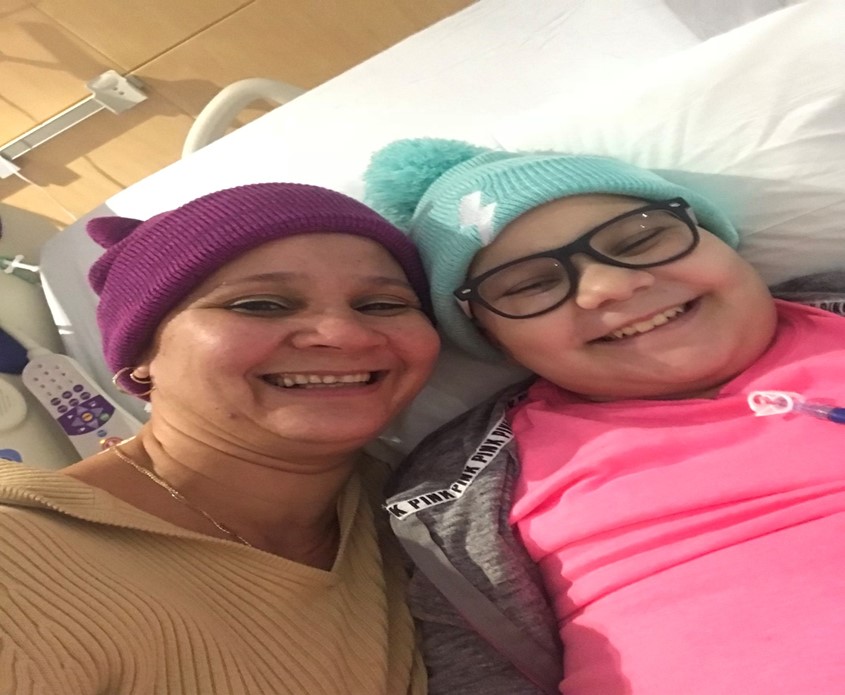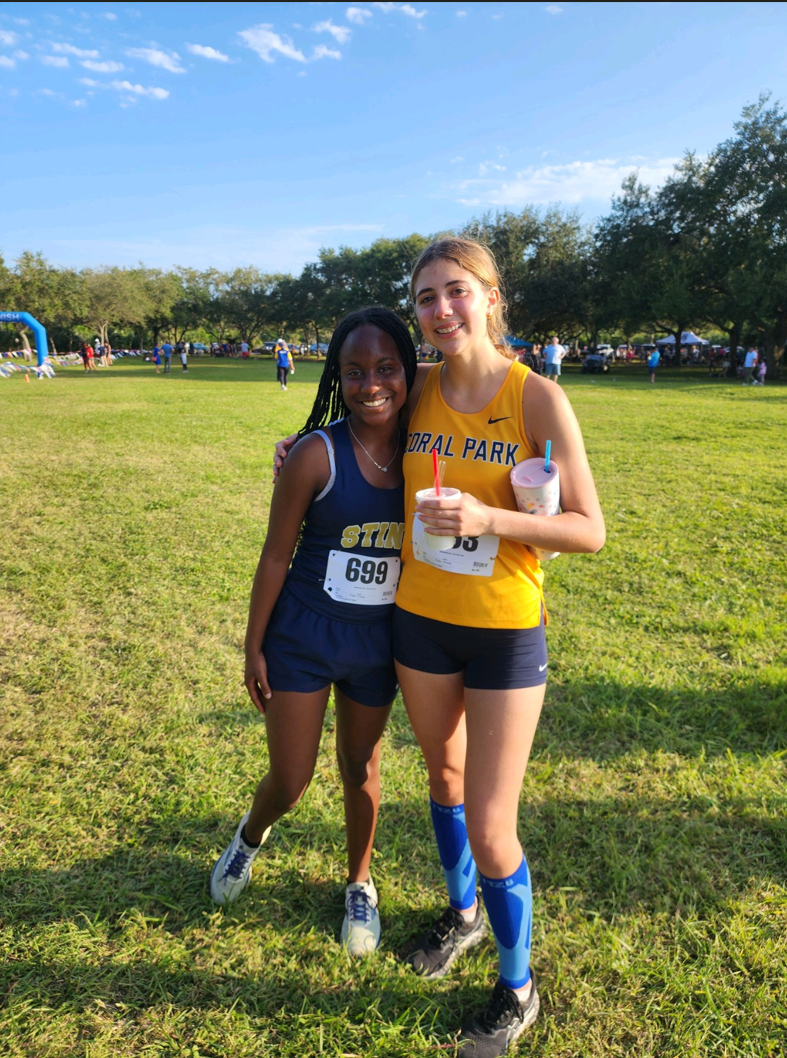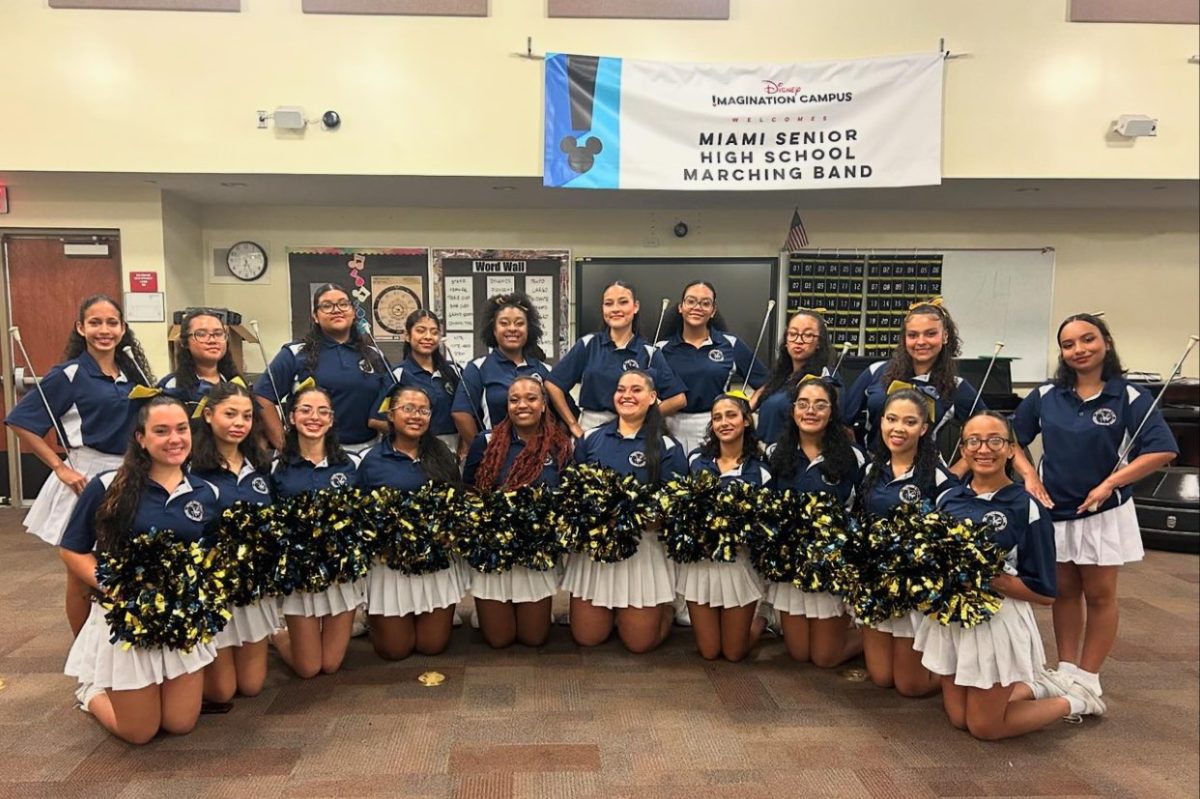Cancer Is A Word, Not A Sentence.
November 2nd, 2017 – This picture was taken during my second chemotherapy. In the picture you can see my mom and I taking a selfie in our hospital room wearing beanies and smiling.
November 2, 2020
Helia Baez is a 16 year old junior at Miami Senior High. At the age of 13, while in 8th grade, she was diagnosed with a tumor on the pituitary gland. She received both chemotherapy and radiation for eight months. On May 3rd, 2018, Helia finished treatment and is currently in remission. She can proudly say that she is a cancer survivor. With this literacy narrative she wrote for her dual enrollment ENC 1101 class, she hopes to show readers that cancer patients are warriors, not victims.
On the morning of October 7th, 2017, I sat on a plain white hospital bed in a pale cold room at the intensive care unit. My parents and I talked and laughed trying to make the best of the situation, unaware that in a matter of minutes my life would be turned upside down. A neurosurgeon with a team of other specialists walked into our room; at that moment, I knew something was wrong but had no idea the extent of the problem. The neurosurgeon sat in front of me and said, “Your brain tumor is inoperable and instead you’ll be receiving treatment.” She talked as if I knew what was happening, but I had no idea.
“So, I have cancer?” I stutteringly asked the doctors.
They looked at me realizing that I’d just found out and couldn’t figure out a way to tell my 13-year-old self that indeed she had cancer. The look on their faces was all the response I needed. It turns out my parents already knew; they just hadn’t told me yet. At first, I felt anger towards my parents for not telling me, but I also understood why they hadn’t. I knew that this was no moment to be angry at one another because we now needed each other more than ever.
My body became paralyzed, I quickly grew pale, and my eyes widened. My mind began to race at a thousand miles per hour. I could not believe what I had just heard. The moment just kept replaying in my head and it was all I could think about. “Oh my god, I’m going to die,” was my immediate thought. “This can’t be true, I must be dreaming,” I kept telling myself.
The people around me kept talking but I couldn’t hear them anymore; it was as if I was in a trance. I’d never been so scared in my life. I looked at my parents as they rushed to console me, but I don’t think anything could at that moment; all I could do was replay that phrase in my head. I was in a state of absolute disbelief. I thought I was going to die and saw all my plans for the future suddenly fade away. Even though I was overwhelmed with emotions and thoughts, I did not cry I knew it wasn’t going to fix anything. After the doctors left, my parents and I talked about what had just happened and they apologized for not telling me sooner. We ended the conversation with a hug; I don’t think I’d ever hugged anyone for that long or that hard. Later that day, we were moved to our new room on 6T, the hospital’s floor for oncology and hematology patients, where we had a visit from the child life specialist, Eli. She was there to help me understand my diagnosis and what was to come. “Think of it this way, in your brain there are cells. Some cells aren’t doing their job, those cells make up your tumor,” she explained. “When this happens, we need to do something about those lazy cells, In your case you’ll be taking chemotherapy.”
“Does chemo have any side effects?” I asked.
“Chemotherapy gets rid of those lazy cells, but unfortunately sometimes good cells get damaged in the process. Chemo can also have some side effects on the rest of your body such as nausea, feeling tired, lowered immune system, and in some patient hair loss,” she replied.
The following days were filled with MRIs, CT Scans, and any other medical exam known to man. Once the doctors had everything they needed, I was ready to begin chemotherapy. To receive chemo, I had to get a port-a-cath implanted in my chest, a small medical device that is placed under the skin of the chest which uses a catheter to connect to the veins; its purpose is to reduce the number of injections. My port was implanted on October 10th and the day after I began chemotherapy. The first chemotherapy was not that bad; I felt only a few side effects and hadn’t yet started losing my hair.
On October 21st we were finally sent home. I’d never been so happy to see my house. We were to return to the hospital on November 1st for my next chemo. During this period, I began to lose hair. One day as my mom detangled my hair, we realized it was falling out much more than usual, so much so that I could pull out globs of it. Even with everything that had happened before, this was the moment where it felt official: I indeed had cancer. That morning all I could do was stare at the hair that kept falling out; I felt powerless and in despair. I decided that I didn’t want to spend the next month watching my hair fall out; it would hurt too much, so instead, I decided to shave it off. That same day, my mom booked an appointment for the hair salon, and we went to shave our hair. My mom said, “As long as you’re bald, I’ll stay bald. We’re in this together.”
That is the sweetest thing anyone has done for me until this day. I had decided not to tell my dad about it and let him find out on his own when he got home. I still remember his reaction, my father turned pale and a little red, his eyes watered, and he gave me a big hug; he too decided to shave his head for me.
For the next eight months, I would be in treatment; unfortunately, the following sessions of chemotherapy weren’t as easy as the first. Slowly, the side effects got worse and worse, I was vomiting seven and eight times a day, even when taking nausea medication. The smell of any food, especially hospital food would make me throw up on the spot. I also became constipated, got mouth sores, and more body aches than I had ever had. On top of that, I was getting sympathy chats, pity looks, insensitive comments, and unsolicited medical advice. I can’t explain how irritating it is for a cancer patient to be told that they should try a “cleanse that cures cancer” or being told, “I know how you feel, I once got a really bad cold.”
I can’t complain though, it wasn’t all bad, or at least my family and I tried to make the best of it. My favorite moments while in the hospital were going out on walks around 6T with my mom and playing air hockey on the floor’s the playroom with my friends who came to visit. This experience taught me to notice the little things and to celebrate small victories like not vomiting for a full day or the fact that I wouldn’t need a transfusion and, to this day that lesson has stuck with me. On May 3rd, 2018, after 30 sessions of chemotherapy and 24 sessions of radiation I wrang the gold bell at the Miami Cancer Institute, a tradition that takes place at the end of a patient’s treatment; this was one of the happiest moments of my life.

It’s funny to think that one simple word, “cancer” can drastically change your life in a matter of seconds. After this word, I spent 8 excruciating months in treatment and will spend a lifetime taking pills, visiting oncologists, getting scans, and with an aching memory of those eight months. That word taught me some very valuable lessons such as not taking things for granted and to appreciate the little joys of life. Lastly, this word changed my view on cancer patients, and after reading this I hope you learn it too. Cancer patients aren’t victims to be pitied rather warriors who are fighting to survive. To any cancer patient reading this, I tell you, there is hope because as I have emphasized many times cancer is a word, not a sentence.






Jeff DeNight • Nov 4, 2020 at 3:04 pm
Being a cancer survivor, who is still loving life, and fighting to be a better warrior in living life, I salute your beautiful story.
My prayers are with you as we fight the fight together.
I wish you and your supportive family, a wonderful holiday season together.
Best of luck.
Sincerely,
Jeff DeNight